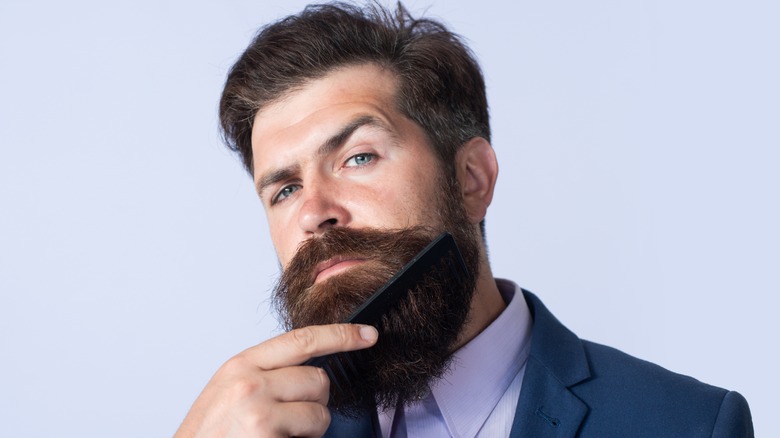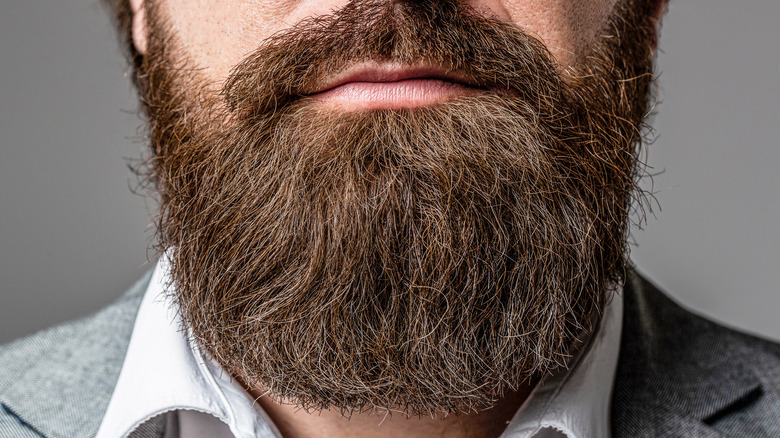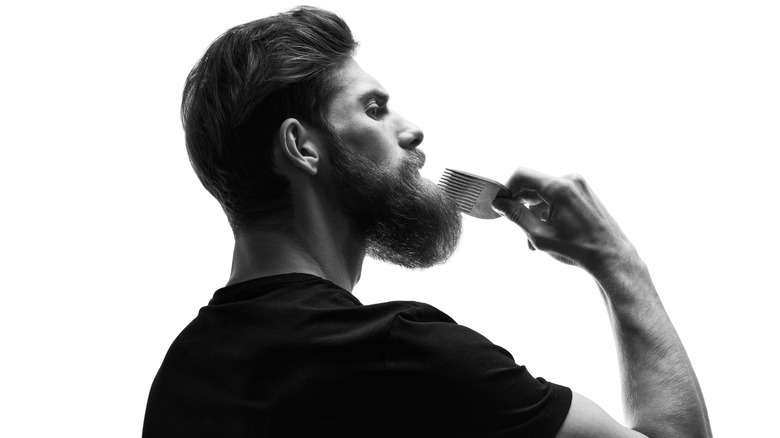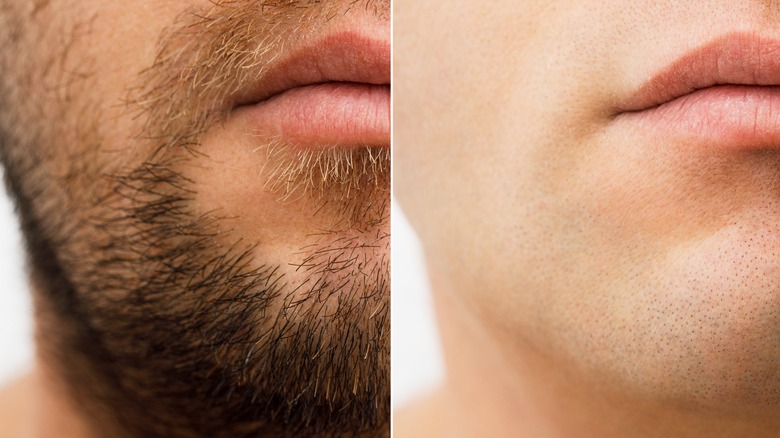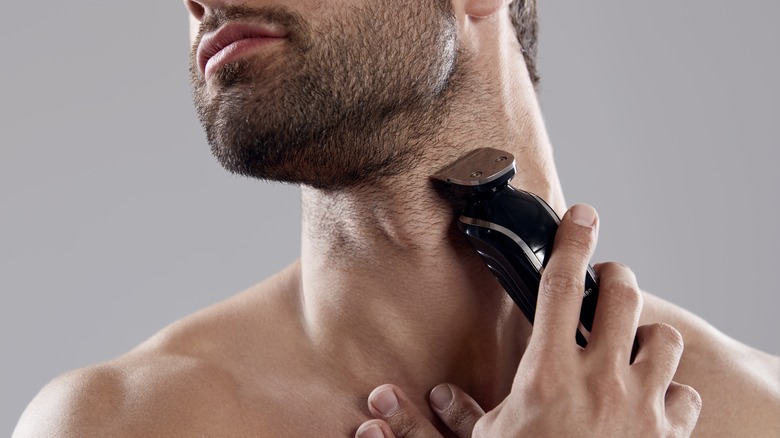How Germy Is A Man's Beard?
Beards are a study in contradictions. Their effect is sometimes magic, often tragic, sometimes gainful, often painful. Whether you grow one yourself or are merely subjected to them, opting to let a face forest grow wild triggers a series of events beyond one's control. If the forested face in question is one that receives kisses, the kisser will now be subjected to routine contact with humanity's version of a used Brillo pad. That's right: "used," not "clean." At least for some people.
Beards have definitely gone in and out of style over the centuries and across cultures. In Ancient Greece, as Shaves2U says, beards were a sign of "honor, virility, and wisdom." Those in Ancient Rome, however, preferred being clean-shaven and associated beards with all those dirty barbarians that eventually overran their empire. During the European enlightenment, folks generally stayed smooth-faced, but we see a shift moving into the Victorian era from the 1830s, as WebMD outlines. Since then, and before then, facial hair worldwide has gone through every single trend, style, and permutation possible. Nowadays, lumberbros might be cool, but beard fads seem to end more quickly than a TikTok video.
And how clean are beards, exactly? The answer is both ultra-simple and unnecessarily complicated at the same. Mission Beards states that the average beard has from 20 to 80 follicles per square centimeter of beardage. That's a lot of scruff to scuff clean of bacteria, keep untangled, trim down, and generally maintain. What of the germs lurking within?
Dirtier than a dog's back?
While discussions of the virtues and vices of beardliness are by no means new, one 2018 study kicked off a recent "eew, get that thing away from me" circulation of beardly information. Released in the journal European Radiology, the study found that beards are dirtier than dog fur, despite the fact that dogs roll in mud and never shower. The report sampled 30 dog coats from between the shoulder blades — a particularly dirty region where skin infections often occur — and sampled male beards from below the mouth. The results found lower microbial counts in dogs than men in 23 out of the 30 dogs sampled, and thereby the report noted that "on the basis of these findings, dogs can be considered as 'clean' compared with bearded men."
The only problem with this "study," in case you didn't sniff out the invalidity already? The sample size for the dogs was the absolute statistically meaningful minimum, 30, and even that number is contested, as Towards Data Science discusses. And the men? The sample size was a paltry 18. That's like taking a sample of 18 people at a Red Lobster in Montana, asking them about their favorite dish, and then writing an article saying, "All Americans everywhere prefer Walt's Favorite Shrimp over Paradise Island Jumbo Coconut Shrimp." And then, unfortunately for the truth, this dog-vs-beard study got copy-pasted, cited, and circulated, clickbait-style, in article after article in The Guardian, USA Today, Insider, Live Science, and more.
Combing deeper
Back in 2016, it was another, earlier micro-article that spawned similar concerns about the bacteria embedded in beard-dom. In this case, as ABC13 reported, the headline read, "Your beard might be as dirty as your toilet," and then had the audacity to say that a "study" determined so. The "study" in question? Local news station KOAT-TV employed microbiologist John Golobic from Quest Diagnostics (via Medical News Today) to traipse about the streets of Albuquerque and swab "the beards of several New Mexico men." Boom: instant online virality and clicks for ad bucks. Healthcare sites like Healthline and WebMD then had to directly address such misinformation in their own articles.
The wording in ABC13's article was also disingenuous. It says that KOAT-TV discovered "some of the same bacteria found in feces" in men's beards. This does not, however, imply that those people are dirtier than the average person. Humans are composed of some 43% non-human cells (via the BBC), and as Popular Science explains, bacteria found in fecal matter is pretty much everywhere: keyboards, phones, shopping carts, clothes, sponges, etc., and even the air.
So what exactly is going on here? Why the determination to peg beards as dirty? Is it just the childish giggles that folks get out of blurting, "Poo in beard!"? Did someone have a bad childhood experience with an uncle at the Thanksgiving dinner table who didn't notice the pile-up of turkey and gravy around his face hole?
To beard, or not to beard
Before you dial 911 and ask for a barber, let's look at some scientifically valid research. One 2014 study published in the Journal of Hospital Infection sampled a much larger population of 408 male healthcare workers. The results showed that those with facial hair were less likely to be colonized with methicillin-resistant staphylococcus aureus (MRSA), a particularly nasty bacteria prone to antibiotic resistance. This study, incidentally, was cited by the aforementioned Healthline and WebMD articles to refute ABC13's later article.
Medical News Today also notes another study that involved swabbing the beards of men on the streets of London. This study found that beards have antibiotic qualities themselves, containing bacteria that will kill their more harmful brethren. Microbiologist John Golobic from the same ABC13 article shows up here, too. He says that if the whole Albuquerque poo-beard thing is representative of the population on a whole or some systemic problem, then someone needs to be concerned about Albuquerque's water source more than anything else.
Additionally, in 2020, Insider described how beards and bare skin are basically equally dirty, in opposition to their 2019 replication of the misinformative "beards are dirtier than dogs" European Radiology article. Both skin and beards contain bacteria that can cause infections if skin is cut. Sarah Hogen, M.D., an instructor at UCLA, sensibly said (via Insider), "We have a complex microbiome on our skin. Everything's always in flux, and it's a very complex microenvironment."
Heard of soap and water?
In the end — brace yourselves, people — beards are clean if you keep them clean. As tedious as such "personal responsibility" may sound to some folks, hopefully all functional adults recall the existence of things like soap and water. So as Insider, WebMD, the University of Pittsburgh Medical Center, Healthline, Beard Resource, and lots more sites advise: wash it. Wash the beard the same as you'd wash any other part. You're not going to shower your whole body except for your left nostril, right? Take advantage of living in 2022 with running water, personal showers, and maybe even some swank beard oil for maximum contouring.
Penn Medicine's Carrie L. Kovarik, M.D., referencing the scientifically sound Journal of Hospital Infection article, says, "Not only were the bearded men less likely to harbor bacteria than their clean-shaven counterparts, but the clean-shaven men actually had higher rates of certain bacterial species. This was attributed to micro-trauma to the skin that occurs during shaving, which could support bacterial growth." So all that shaving? The more you scrape, scratch, and cut, the more you're chewing up your skin and exposing yourself to real bacterial infections.
So what's the final lesson? Embrace the face bush. As Gandhi said, "Be the beard you want to see in the world." Just kidding, he didn't say that. He didn't actually say the other thing, either, about change (via Illumination Curated). What were we saying? Ah yes: be clean, be cool, and be beardy.
